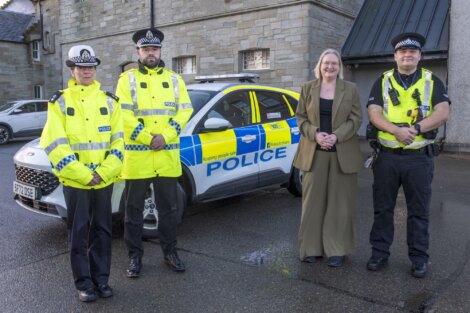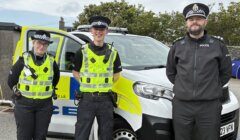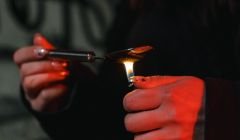Police / Local officers trained up in using roadside drug testing kit
Shetland is involved in a pilot project to expand testing beyond road policing officers
SHETLAND’s police officers are now trained in using new roadside test kits to help detect people driving under the influence of drugs.
Shetland area commander chief inspector Chris Sewell said the new training has already paid off, with detections this week.
He also believes it will be a “big step forward” for road safety in Shetland.
Shetland officers are the first in Scotland outside of road traffic specialists to have training in the mouth swab Drug Wipe kits as part of a six-month trial.
They are used to test people’s saliva while on the roadside.
Similar to roadside alcohol breathalysers, if a potential offence has occurred then the person would be taken to the police station for further tests.
Police Scotland’s head of road policing chief superintendent Hilary Sloan was in Shetland on Thursday alongside the Scottish Police Authority’s director of forensic services Fiona Douglas to speak more about the trial.
Sewell said officers received training last week.
Explaining why Shetland was picked to pilot the training roll-out, Sloan said: “Road policing officers are trained as a matter of course in the use of drug wipes.
“However we felt that this was a really good opportunity to come up to Shetland to train local policing officers because it was a compact area to be able to do so, and to really pilot it and see what benefit it brings to the local community.
“We’ll pilot it and evaluate it, seek feedback from the community, from local councillors, from the officers themselves, and then obviously decide on what we’re going to do thereafter.”
One local police officer who took part in the training last week was Cammy Barron.
He felt it will bring a “massive benefit” to Shetland.
The officer said drug wipes are very similar to breathalyser kits, with the mouth saliva test giving results in eight to 15 minutes.
Become a member of Shetland News
“Once we’ve done the roadside tests, if it comes back positive that person would be arrested under the suspicion of driving under influence of drugs, brought back to a police station where there would be evidential samples of blood taken which would then be sent away to labs to be tested,” Barron said.
“Once that comes back, if it’s positive they’d be reported through the court.”
Sloan said roadside drug testing enhances what local officers were already able to do.
Sewell, who said there is other legislation that officers can use to deal with potential drug drivers, also felt that the community knowing that officers are now ready to test people on the roadside could act as a deterrent too.
“It’s another tactical option that we’ve got to make the roads safer,” the police chief said.
Sewell added that it is known there is a “problem in relation to there being far too many people driving under the influence of drink in Shetland”.
“I strongly suspect there are people driving under the influence of controlled drugs in Shetland and this is a big step forward in terms of improving road safety in the islands going forward,” he added.
Meanwhile Douglas said the Shetland trial was also important in terms of how Police Scotland rolling out more roadside drug testing impacts on laboratory capacity when it comes to samples taken at stations.
“We need to make sure we invest in building more capability and capacity within the laboratory to scale up the operation to meet what Police Scotland want to achieve through the roll-out of the testing,” she said.
Meanwhile Sloan described drug use as a “societal issue within Scotland”.
“I think really the ability to tackle drug use as a collaboration is really important, so it’s not just the police’s responsibility – it’s society’s responsibility in conjunction with Scottish Government,” she added.
“We need to educate people as well around the dangers of drugs and then clearly the dangers of taking drugs or drinking and then driving.”
As the festive season approaches Sloan said a key message was for people to leave the car at home if they are drinking or taking drugs.
“The festive campaign was launched on Monday and the message there is society’s concern around road safety,” said.
“It’s not just one partner agency – everybody needs to look out for each other on the roads, and the dangers of taking drink or drugs and then driving, because it can have a significant impact on the individual, anybody who is involved in the collision, including fatalities, and that community.
“It’s getting that message out there to not even consider and drinking or taking drugs and then driving. Just leave the car at home.
“Asking for individuals to speak to people, members of their family, friends who they think might be taking drink or drugs and driving, [to say] that it’s not a good idea. Think of the impact on your life, your family.”
Become a member of Shetland News
Shetland News is asking its readers to consider paying for membership to get additional perks:
- Removal of third-party ads;
- Bookmark posts to read later;
- Exclusive curated weekly newsletter;
- Hide membership messages;
- Comments open for discussion.
If you appreciate what we do and feel strongly about impartial local journalism, then please become a member of Shetland News by either making a single payment, or setting up a monthly, quarterly or yearly subscription.






















































































